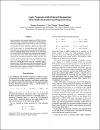Browsing Computer Science & Engineering by Subject "Answer set programming"
Now showing items 1-5 of 5
-
Compliance checking for usage-constrained credentials in trust negotiation systems
( Springer Berlin Heidelberg , 2012 , Conference Paper)We propose an approach to placing usage-constraints on RT credentials; issuers specify constraints by designing non-deterministic finite automata. We show by examples that this approach can express constraints of practical ... -
Constraint-enhanced role engineering via answer set programming
( Association for Computing Machinery , 2012 , Conference Paper)Role engineering (RE) aims to develop and maintain appropriate role-based access control (RBAC) configurations. However, RE with constraints in place is not well-studied. Constraints usually describe organizations' security ... -
Logic programs with ordered disjunction: First-order semantics and expressiveness
( AAAI Publications , 2014 , Conference Paper)Logic programs with ordered disjunction (LPODs) (Brewka 2002) generalize normal logic programs by combining alternative and ranked options in the heads of rules. It has been showed that LPODs are useful in a number of areas ... -
Reasoning about security policies of services using answer set programming
( Institute of Electrical and Electronics Engineers Inc. , 2014 , Conference Paper)In this paper, we propose a formal framework for checking the consistency of security policies of services using Answer Set Programming (ASP). We illustrate that the formalisation of security policies of the service providers ... -
Social access control language (SocACL)
( Association for Computing Machinery , 2013 , Conference Paper)Online Social Networks hold vast amounts of readily accessible personal information leaving them particularly vulnerable to privacy breach attacks [6]. With the impact these breaches varying from simply embarrassing the ...


